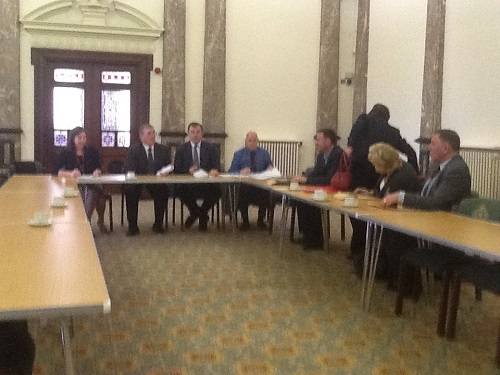4 councillors ban filming at Merseyside Police and Crime Panel public meeting but support police filming the public

Merseyside Police and Crime Panel (Birkenhead Town Hall) 24th April 2014 taken after the meeting had finished Left to Right Knowsley Metropolitan Borough Council officer, Councillor Frank Prendergast (Vice-Chair) (Labour, Liverpool City Council), Knowsley Metropolitan Borough Council officer, Knowsley Metropolitan Borough Council officer, Joseph Edwards (Independent Co-opted Member) (Mr. Edwards wasn’t present from the start of the meeting but arrived late), Councillor Moira McLaughlin (Labour, Wirral Metropolitan Borough Council), Councillor Doreen Kerrigan (Labour, Sefton Metropolitan Borough Council), Councillor Peter Brennan (Labour, Liverpool City Council)
The meeting started with two announcements the Vice-Chair (Councillor Prendergast) wished to make. The first was he asked for the noisy tea urn at the back of the room to be switched off as he said he had hearing problems. The second announcement Councillor Frank Prendergast (Labour, Liverpool City Council) wanted to make was to say that a request was made to film the public meeting of the Merseyside Police and Crime Panel which he had turned down because “confidential” things may be said during the meeting. However he said the public were welcome to stay for the whole meeting.
At this point as the Chair said it was his decision, I asked if he was making that on behalf of the whole Merseyside Police and Crime Panel as their rules of procedure agreed by the Merseyside Police and Crime Panel last July stated that this decision was of the whole Panel:
“21.1 No audio or visual record of proceedings (or part of the proceedings) of a Panel, Sub-Committee or Working Group meeting may be taken without the express permission of the Panel, Sub-Committee or the Working Group concerned.”
He replied that he was. None of the other three Labour councillors present said anything at this point, nor was a vote taken. I asked the Chair at the close of the meeting to provide a quote as to why he’d been against the public meeting being filmed. He told me he was too busy to provide a quote as he had to leave (the meeting was held in Birkenhead) to go to Clatterbridge via Liverpool.
Although the Openness of Local Government Bodies Regulations 2014 which prevent bodies such as the Police and Crime Panel stopping filming of their public meetings have been laid before the House of Commons on the 3rd April 2014 by the Rt Hon Eric Pickles MP, due to Parliament breaking up for Easter a week later a resolution approving the Openness of Local Government Bodies Regulations 2014 hasn’t yet been passed by the House of Commons and House of Lords. So it doesn’t yet have the force of law.
However this is what Labour’s front bench spokesperson, Hilary Benn MP had to say when the issue was debated last year in the House of Commons:
The Merseyside Police and Crime Panel is a joint committee of the councils on Merseyside. The new Labour chaired Liverpool City Region Authority also declined a request to film their first public meeting. The Liverpool City Region Authority’s constitution delegated such matters to the Chief Executive of Knowsley Metropolitan Borough Council Sheena Ramsey. Knowsley Metropolitan Borough Council is also the host authority for the Merseyside Police and Crime Panel.
Has the message from Labour’s front bench spokesperson Hilary Benn MP to “support the change” to “allow the recording and videoing of council and committee meetings” fallen on deaf ears? Do the four Labour councillors who made the decision to prevent filming yesterday (Councillor Frank Prendergast, Councillor Doreen Kerrigan, Councillor Peter Brennan and Councillor Moira McLaughlin (who is currently Labour’s candidate in Rock Ferry ward)) realise how strange it seems for their party’s national spokesperson to say one thing yet Labour councillors locally on Merseyside to do the complete opposite?
My comments on what happened are that currently the public (and press) already do have the right to film, blog and tweet at public meetings. This is granted to them by article 10 (freedom of expression) of the Human Rights Act 1998 c.42. It is unlawful for any public body to act in a way that is incompatible with article 10 (freedom of expression) due to section 6 of the Human Rights Act 1998. In an ironic twist the Merseyside Police and Crime panel during the meeting discussed the wearing of cameras in public by police officers and were supportive of it.
If you click on any of the buttons below, you’ll be doing me a favour by sharing this article with other people.